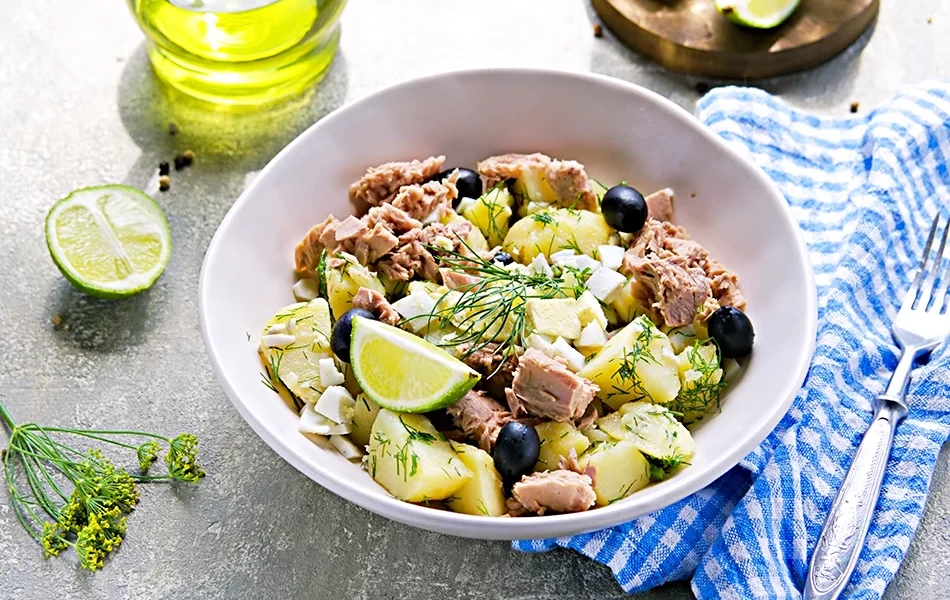Mediterranean Diet and Intermittent Fasting: Does It Work?
There’s no denying the benefits of intermittent fasting and the Mediterranean diet, but does it make sense to combine the two?

If you’re looking to lose weight and improve your overall health, the Mediterranean diet and intermittent fasting may be the perfect combination.
In this article, we will explore the benefits of the Mediterranean diet and intermittent fasting, as well as how they can be used together to achieve your health and wellness goals. We will also look at the science behind these two diets, the potential benefits, and the risks associated with them.
What Is a Mediterranean Diet?
The Mediterranean diet is a style of eating similar to that of people living in countries bordering the Mediterranean Sea, such as Greece, Italy, and Spain.
It is characterized by an emphasis on whole, unprocessed foods and an overall balanced approach to eating, meaning that nothing is technically off-limits.
That being said, the Mediterranean diet is a plant-rich diet that prioritizes eating the following foods:
- Plant-based foods: fruits, vegetables, and legumes
- Whole grains: brown rice, oats, barley
- Healthy fats: extra-virgin olive oil and nuts
- Fish and seafood: salmon, mackerel, and sardines
- Small amounts of poultry and dairy: chicken, cheese, and yogurt
What Is Intermittent Fasting?
Intermittent fasting isn’t necessarily a diet but more an eating pattern that cycles between periods of fasting (not eating) and eating.
There are several popular methods of intermittent fasting, including:
- 16:8: fast for 16 hours, eat for 8 hours
- 14:10: fast for 14 hours, eat for 10 hours
- 5:2: eat for 5 days, fast for 2 days
- Alternate-day fasting: modified fasting every second day
- 24-hour fast: 24-hour fast followed by normal eating patterns
Can You Combine Mediterranean Diet and Intermittent Fasting?
Yes, many people choose to combine the Mediterranean diet and intermittent fasting to maximize the health benefits – such as improved weight loss and cardiovascular health – of both eating styles.
Benefits of Mediterranean Diet and Intermittent Fasting
Combining the Mediterranean diet with intermittent fasting makes a lot of sense, as they offer several overlapping benefits related to their effects on weight loss, heart health, blood sugar control, and brain health.
Below, we’ll take a closer look at the benefits of combining fasting with a Mediterranean-style diet.
#1 Improved cardiovascular health
Practicing intermittent fasting is an easy way to lower blood pressure and naturally improve heart and vascular health. Studies also show that, regardless of its effects on weight, fasting helps lower both blood pressure and cholesterol.
These benefits can be enhanced by combining the Mediterranean diet with intermittent fasting. In part due to the effect that omega-3 fatty acids – which are found in healthy fats like nuts and extra-virgin olive oil – have on lowering total cholesterol levels.
#2 Weight loss
Fasting is an easy solution for preventing weight gain because it naturally limits the amount of time you spend eating per day, making eating in a calorie deficit – which is widely regarded as one of the best ways to lose weight –more accessible.
Combining intermittent fasting with a Mediterranean diet, which is rich in healthy fats, can help accelerate weight loss through increasing feelings of satiety during fasting windows.
#3 Reduced risk of age-related conditions
Parkinson’s disease, Alzheimer’s disease, cancer, and diabetes are all examples of common age-related conditions.
Many of these conditions happen as the result of something called oxidative stress, which is essentially tissue damage caused by an excess of free radicals in the body.
The substances that remove free radicals from the body are called antioxidants and can be found in high quantities in things like fruits, vegetables, whole grains, and extra-virgin olive oil – all of which are eaten in abundance in the Mediterranean diet.
Another proven method for reducing oxidative stress in the body is calorie restriction, making intermittent fasting another option for supporting healthy aging.
#4 Improved insulin resistance
Intermittent fasting and the Mediterranean diet may both improve insulin sensitivity, which is the cause of many diseases, such as diabetes.
Insulin resistance happens when the cells of the body don’t respond normally to insulin, a hormone that is used for regulating blood sugar.
Some mild effects of insulin resistance include headaches and frequent hunger, while more severe cases cause metabolic syndrome, which can lead to cardiovascular disease.
Eating a plant-rich diet, such as the Mediterranean diet, can help prevent blood sugar spikes and reduce inflammation in the body.
Intermittent fasting is also used for treating insulin resistance as it can help balance hormones and blood glucose levels and cause weight loss, which positively impacts insulin sensitivity.
Tips for Successfully Combining Intermittent Fasting and the Mediterranean Diet
Intermittent fasting combined with the Mediterranean diet can improve cardiovascular health and benefit the body in many ways.
And while this style of eating might seem simple, changing your dietary habits is anything but easy. Using fasting-specific supplements can make not eating easier, and the following tips can be used to create lasting changes to the way you eat.
#1 Plan your meals
Meal planning can be a valuable tool when trying to stick to a new diet for a few different reasons.
Not only does it save you from taking daily trips to the grocery store, but it also helps you ensure you have healthy options at home, preventing unhealthy snacking in between meals.
Most importantly, planning your meals in advance will allow you to create consistent and lasting changes to the way you eat.
#2 Invest in high-quality olive oil
Extra virgin olive oil is a staple of the Mediterranean diet. It is responsible for providing the body with healthy fats – including omega-3 fatty acids – that replace the unhealthy saturated fats found in other animal proteins such as beef and lamb, which are commonly eaten in alternative diets.
Considering you will be infusing it into most of your meals, it’s important to purchase a high-quality product in order to maximize its benefits.
High-quality extra-virgin olive oil is higher in nutrients like oleic acid and antioxidants and is significantly more aromatic and noticeably better tasting than lower-quality oil products.
#3 Ensure your protein comes from plants or seafood
Another important step in following the Mediterranean diet is limiting your animal food sources to include mostly fish and seafood.
Fish like salmon and mackerel are another important source of healthy fat and are higher in protein and lower in fat than many other animal proteins.
High-protein plants include things like beans, lentils, and whole grains like quinoa. They have the added benefit of being high in fiber – with one cup of cooked quinoa containing close to 20% of the daily fiber recommendation.
Getting the daily recommendation of dietary fiber can also help to enhance cardiovascular health, as high-fiber diets are effective in reducing blood pressure and lowering LDL cholesterol levels.
#4 Stay active
Regular exercise is an important part of living an overall healthy lifestyle and can be used as a replacement habit for unhealthy snacking – with going for a walk offering a much-needed distraction during longer fasts.
Not only that, but regular exercise has been shown to regulate appetite-stimulating hormones, helping you feel more satiated between meals.
Who Should Not Try Intermittent Fasting?
The Mediterranean diet is available for anyone to try and can provide health benefits with little to no risk, but the same can’t be said for intermittent fasting or time-restricted eating.
To ensure personal safety, the following people shouldn’t start intermittent fasting without first consulting a medical professional:
- Anyone under the age of 18
- People who are currently underweight
- Pregnant or breastfeeding women
- Anyone with a history of eating disorders
- People with diabetes
- Anyone taking medication for a medical condition
A Word From a Nutritionist
Combining the Mediterranean diet with intermittent fasting is a powerful combo for fighting cardiovascular disease and generally helping you feel your best. But making two big changes to your dietary habits can feel like a lot all at once!
Instead, it’s a better idea to stick to making one big change to your diet to start – such as starting with a Mediterranean diet and then incorporating the 16:8 fasting method as you feel ready.
Remember that change isn’t something that happens overnight. Making small sustainable changes is the best way to ensure that they last a lifetime and not only a few months.
FAQs
Yes, both the Mediterranean diet and intermittent fasting are useful weight loss techniques that can prove even more useful when combined.
Unlike many other popular diets, there aren’t any off-limit foods in the Mediterranean diet. However, there are certain foods that are typically avoided when following this eating style, including red meat, added sugar, refined grains, and processed foods including processed meat.
One of the easiest intermittent fasting techniques to follow is the 16:8 method, which involves eating during an 8-hour window and fasting for 16 hours of the day.
Conclusion
The Mediterranean Diet and intermittent fasting are both healthy and effective diets that can help improve your overall health and wellness.
The Mediterranean diet is rich in fruits, vegetables, whole grains, and healthy fats, and intermittent fasting can help you lose weight and control hunger. When used together, these two diets can be a powerful combination for achieving your health and wellness goals.
That being said, it is important to consult with a qualified health professional before starting any dietary program to ensure it is right for you.

















































 Select your language:
Select your language: 








